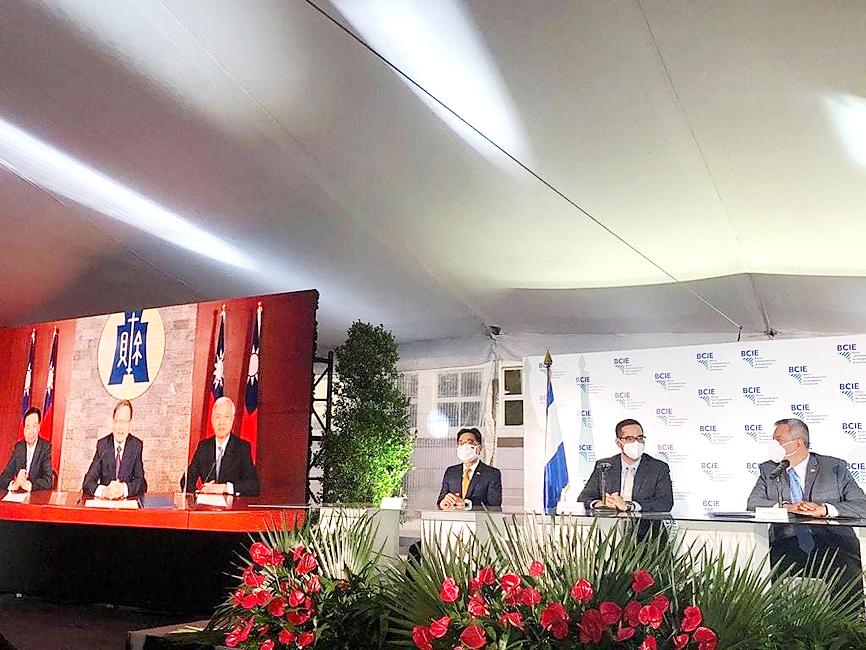The Central American Bank for Economic Integration (CABEI) is to open a regional office in Taiwan, the first in the nation by an international development financial institution, the Ministry of Finance said yesterday.
The agreement to establish the office was signed by Minister of Finance Su Jain-rong (蘇建榮) and CABEI executive president Dante Mossi during a virtual meeting, the ministry said.
The office, which is to open in June, would be the first of the development bank’s in Asia, Deputy Minister of Finance Juan Ching-hwa (阮清華) told a news conference in Taipei.

Photo courtesy of the Ministry of Foreign Affairs
CABEI is headquartered in Honduras and has regional offices in seven other Central American countries. The institution has 15 member states — including Taiwan, which holds an 11.09 percent stake in the bank, the highest among the seven non-regional members, the ministry said.
Taiwan joined CABEI in 1992 as “Republic of China (Taiwan).”
The opening is proof of Taiwan’s critical international presence, Juan said.
Founded in 1960, CABEI’s main objective is to “promote the economic integration and the balanced economic and social development of the Central American region,” the bank’s Web site said.
CABEI’s regional offices focus mainly on debt management and providing member states with financing for infrastructure projects, Juan said.
However, the Taipei office would mainly be tasked with establishing ties with Taiwan’s capital market, he said.
The office would help Taiwan boost its capital market and build closer links with Central America, he said.
Cooperation facilitated by the office would allow Taiwan to participate in the political and social development of the region, and raise its international visibility, Juan said.
Taiwan is the bank’s largest creditor in Asia, with a credit volume of US$2.65 billion, ahead of Japan, Hong Kong, Thailand and Singapore, he said.
Taiwan is temporarily represented by Su and central bank Deputy Governor Chen Nan-kuang (陳南光) in CABEI’s board of governors.
Taiwan would likely be granted a permanent seat in the future, the ministry said.

Seventy percent of middle and elementary schools now conduct English classes entirely in English, the Ministry of Education said, as it encourages schools nationwide to adopt this practice Minister of Education (MOE) Cheng Ying-yao (鄭英耀) is scheduled to present a report on the government’s bilingual education policy to the Legislative Yuan’s Education and Culture Committee today. The report would outline strategies aimed at expanding access to education, reducing regional disparities and improving talent cultivation. Implementation of bilingual education policies has varied across local governments, occasionally drawing public criticism. For example, some schools have required teachers of non-English subjects to pass English proficiency

‘FORM OF PROTEST’: The German Institute Taipei said it was ‘shocked’ to see Nazi symbolism used in connection with political aims as it condemned the incident Sung Chien-liang (宋建樑), who led efforts to recall Democratic Progressive Party (DPP) Legislator Lee Kun-cheng (李坤城), was released on bail of NT$80,000 yesterday amid an outcry over a Nazi armband he wore to questioning the night before. Sung arrived at the New Taipei City District Prosecutors’ Office for questioning in a recall petition forgery case on Tuesday night wearing a red armband bearing a swastika, carrying a copy of Adolf Hitler’s Mein Kampf and giving a Nazi salute. Sung left the building at 1:15am without the armband and apparently covering the book with a coat. This is a serious international scandal and Chinese

TRADE: The premier pledged safeguards on ‘Made in Taiwan’ labeling, anti-dumping measures and stricter export controls to strengthen its position in trade talks Products labeled “made in Taiwan” must be genuinely made in Taiwan, Premier Cho Jung-tai (卓榮泰) said yesterday, vowing to enforce strict safeguards against “origin laundering” and initiate anti-dumping investigations to prevent China dumping its products in Taiwan. Cho made the remarks in a discussion session with representatives from industries in Kaohsiung. In response to the US government’s recent announcement of “reciprocal” tariffs on its trading partners, President William Lai (賴清德) and Cho last week began a series of consultations with industry leaders nationwide to gather feedback and address concerns. Taiwanese and US officials held a videoconference on Friday evening to discuss the

PERSONAL DATA: The implicated KMT members allegedly compiled their petitions by copying names from party lists without the consent of the people concerned Judicial authorities searched six locations yesterday and questioned six people, including one elderly Chinese Nationalist Party (KMT) member and five KMT Youth League associates, about alleged signature forgery and fraud relating to their recall efforts against two Democratic Progressive Party (DPP) legislators. After launching a probe into alleged signature forgery and related fraud in the KMT’s recall effort, prosecutors received a number of complaints, including about one petition that had 1,748 signatures of voters whose family members said they had already passed away, and also voters who said they did not approve the use of their name, Taipei Deputy Chief Prosecutor